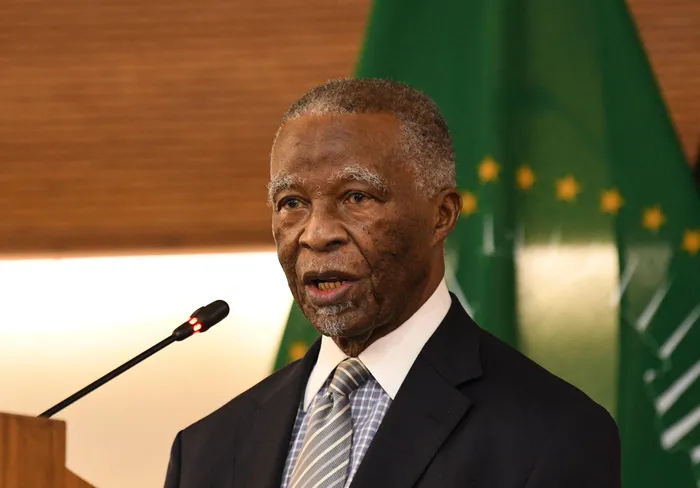Victims of apartheid-era violations urge Mbeki and ex-minister to await TRC commission

Former president Thabo Mbeki and ex-Justice minister Brigitte Mabandla want to intervene in the case brought by survivors and families of victims of apartheid-era atrocities, who are demanding answers on why cases referred to the NPA and the police by the Truth and Reconciliation Commission were never pursued.
Image: DIRCO
Former president Thabo Mbeki and former Justice minister Brigitte Mabandla must wait for the commission of inquiry into the failure to prosecute cases referred by the Truth and Reconciliation Commission (TRC) to set the record straight.
This was the response from the families of victims and survivors of apartheid-era crimes to Mbeki and Mabandla’s application to intervene in the Gauteng High Court, Pretoria, matter challenging the government’s conduct in unlawfully refraining and/or obstructing the investigation and/or prosecution of apartheid-era cases referred by the TRC to the National Prosecuting Authority (NPA).
Additionally, the families and survivors of apartheid-era gross human rights violations want the high court to declare that the conduct amounting to unlawfully abandoning or undermining these cases violated their rights to equality, dignity, and the right to life and bodily integrity as enshrined in the Constitution.
In their application, the families and survivors have asked the high court to declare the state’s failure to prosecute the cases inconsistent with the country’s constitutional values and the rule of law as enshrined in the Constitution.
In response to Mbeki and Mabandla’s application to intervene, Lukhanyo Calata, the son of the late Fort Calata who, along with Matthew Goniwe, Sicelo Mhlauli, and Sparrow Mkonto, became known posthumously as the Cradock Four, said the former president and erstwhile minister have no direct and substantial interest in the main application, given that no relief is sought against them in their personal capacities.
“The relief they seek is against the current President (Cyril Ramaphosa) and the Minister of Justice (Mmamoloko Kubayi), both of whom have been cited as respondents in the main application,” Calata stated.
The Cradock Four were abducted, tortured, murdered, and their bodies burned by the Security Branch of the apartheid-era SA Police on June 27, 1985.
Calata said if Mbeki and Mabandla wish to set the record straight, the commission of inquiry established by Ramaphosa is the appropriate forum.
“It is that body which will have the power to investigate allegations and make findings. The president has already undertaken to establish the aforesaid commission by the end of May,” he explained.
Mbeki and Mabandla had expressed their unhappiness with serious allegations of unconstitutional, unlawful, and criminal conduct against them, which they believe are highly defamatory and damaging to their dignity and reputations.
Calata stated that this was not the first time that Mbeki attempted to intervene in proceedings in which he felt aspersions had been cast on his character and that in an earlier matter also dealing with claims of political interference, the Supreme Court of Appeal dismissed his application on the grounds that negative findings or disparagement do not constitute a direct or substantial interest to intervene.
Ramaphosa is expected to announce the head of the commission of inquiry, the timeframes, and the full terms of reference.
The commission’s establishment was the outcome of settlement discussions in a main application brought by families of victims of apartheid-era crimes.
Other matters, such as declaring the government acted unlawfully and violated the families and victims’ rights, and the payment of R167 million in constitutional damages they seek, were unable to be resolved through settlement negotiations and will head to court.
Cape Times